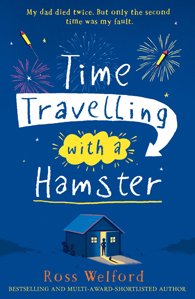 Time Travelling with a Hamster, by Ross Welford
Time Travelling with a Hamster, by Ross Welford
How could I not buy it, with that title? Not to mention the strapline on the cover: “My dad died twice. But only the second time was my fault.” I could very lazily say this is Back to the Future without the budget, sass, rock’n’roll, wish fulfilment and American setting. In fact it’s mostly set around Blyth, up the coast from Newcastle. The time travel is firmly rooted in Einsteinian thought, with a dash of Hindu philosophy, and derives its power from sheer mathematics – which is why the time machine itself is a laptop, a black box and a zinc tub that you stand in. But mostly it’s a moving tale of coping with bereavement told from the point of view, and in the style, of a slightly nerdy 12-year-old boy who just wants his dad back. The time travel itself doesn’t kick in until halfway through.
The boy is Albert Einstein Hawking Chowdhury, Al for short. You might gather his dad is a bit of a physics geek. The hamster is called Alan Shearer and is Al’s closest friend; yes, Al is aware how sad that sounds. Alan Shearer is there for good plot reasons and plays as important a role as a dumb rodent can. Al’s father died four years ago as a result of late effects of a childhood accident he suffered in 1984. His mum has remarried a widower from work so Al has a stepfather and stepsister. Everyone has moved on as best they can. No one is truly unhappy – but no one could be described as fully happy either.
But, the dad had invented time travel just before he died. He discovered this by hopping forward just a few days, and learning that he was dead. In fact, he could only travel forward in time because he was dead in the future; a fundamental rule of this kind of time travel is there can never be more than one of you in existence. If you try it, the time machine simply doesn’t work and you’re standing in a zinc tub feeling slightly foolish. So, no meeting doppelgangers. This means Al’s father can’t go back in time to 1984 and prevent the accident that will ultimately kill him – but he can see to it that one day Al will.
I’m very wary of time travel stories that blithely wipe out an entire timestream just so that other people can be happy (looking at you, Trek). Like, they’re the only ones that matter? What makes this work is that in the great scheme of things, no one is important enough to be cosmos changing. No one gets actively unhappier than they would have been; a few key people get happier. *** SPOILER ALERT *** The really eye misting scene is right at the end, and I can visualise this whole bit perfectly should anyone ever want my advice on adapting the book for screen. For plot reasons Alan Shearer has to be left behind in 1984 with dad-as-a-boy; but in the present, Al not only gets his dad back but meets Alan Shearer’s great-great-great-great-great-great-great-great-grandson.
